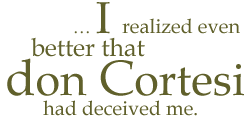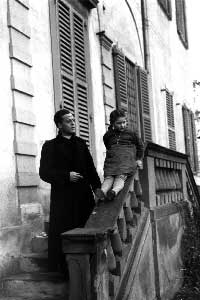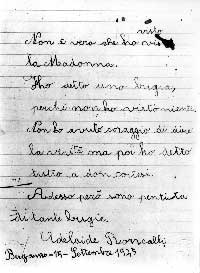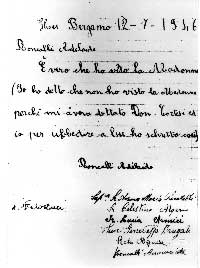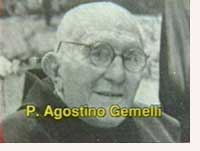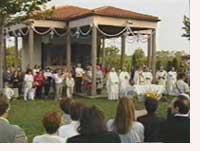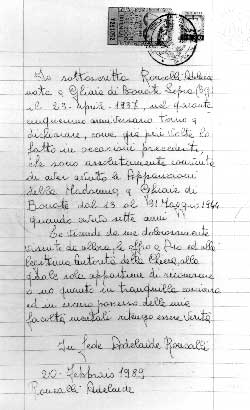|
Cortesi's intervention
Don Luigi Cortesi, young philosopher and brilliant teacher of Bergamo's
Seminary, arrived at Ghiaie on Friday 19th May 1944. He soon took
action with the typical scholar's inquiring attitude, with urbanity
and amiability, so much so that it was not difficult for him to
take the matter in his hands and play the role of the inquisitor
of the events connected with Ghiaie. He did not act with a bishop
mandate but of his own free will. By attending the apparitions,
he infringed the Bishop's prohibition but he thought that the church
authorities would allow somebody to infringe the prohibition in
order to investigate and report the events. On the 22nd May he gave
an abundant account to the bishop, who did not reproach him but
thanked him instead. He interpreted those thanks like an implied
consent and went on studying the little girl who in the meantime
had been taken to Bergamo. On the 27th May, the implied consent
became an explicit permission and from that day on Don Cortesi took
the matter in his hands. After the apparitions, the child was taken
away from Ghiaie and Don Cortesi gave orders that nobody approached
the girl without his permission.
Retractation
Don Cortesi soon proceeded to play the devil's advocate and submitted
the young girl to the hardest trials for a long time, by pressing
the child's psyche and conscience hard. On the 15th September 1945
he finally succeeded in making her retract the truth by deceitfully
compelling her to write the following on a diary page:
|
"It is not true that I saw Our Lady. I told a lie,
because I saw nothing. I did not have the courage to speak
the truth, but then I told everything to Don Cortesi. Now
I regret having told so many lies. Adelaide Roncalli. Bergamo-15th-September
1945".
|
Here is how Adelaide reported the episode in her diary: "In
a room of the Orsoline's convent in Bergamo, after closing all doors,
Don Cortesi dictated the words to be written on the wretched note.
I remember perfectly that, on account of the state of moral violence
I was being submitted to, I stained it and he split the sheet of
paper and made me write it again, with great patience, in order
to reach his aim. That's how the betrayal was carried out."
It went from bad to worse for a long period and don Cortesi carried
on with his cruel inquisitional action. After increasing protests
from honest people, Bergamo's bishop was obliged - too late indeed
- to prohibit don Cortesi from approaching the child.
The reassertion
Once back in her family for a few weeks off, on the 12th July 1946,
at the infant school of Ghiaie di Bonate, Adelaide reasserted in
writing the following:
|
"Ghiaie Bergamo 12-7-1946Roncalli AdelaideIt is true
that I saw Our Lady (I formerly said that I did not see Our
Lady because Don Cortesi had dictated this to me and I wrote
what he wanted out of obedience).Roncalli Adelaide"
The paper was signed by 7 witnesses too: the parish priest,
the 4 nuns, Rota Agnese and Roncalli Annunciata.
|
Adelaide wrote in her diary:
"In 1947 I went to the "Wisdom" Sisters' and here
I made a big mistake: I related all that had happened in the apparitions,
claming with precision I had seen Our Lady and heard her words.
Towards the end of my narration I was seized
with fear; don Cortesi's words: "You do evil when you claim
you have seen Our Lady" overwhelmed me. At first I kept
silent, then I made up my mind to repeat what I had learnt from
don Cortesi, and so I said I had not seen the Virgin Mary."
These few lines are enough to understand by what form of psychological
violence don Cortesi had brought the child into a state of total
subjection.
Father Agostino Gemelli's positive report
On the 11th July 1944, Father Agostino Gemelli, world-famous psychiatrist
and psychologist, expressly entrusted by the bishop with the in-depth
examinations of the child Adelaide Roncalli, wrote the following
among other things, while concluding his long report sent to monsignor
Bernareggi, bishop of Bergamo
"It is to be excluded that the person in question is abnormal
and that mendacity underlies the story of the visions. My four-day-long
observation would have enabled us, especially through mental tests,
to show up such a personality in whose clinical picture the wish
for lying or showing her own personality under a light different
from reality would have appeared immediately and plainly. That
can be absolutely ruled out, also because the young girl
never runs back over the story of the visions spontaneously; when
questioned, she hangs her head, looks grave, falls silent; besides,
all her personality appears to the psychiatrist like
a personality dominated by spontaneity, simplicity, directness,
that is by characters that cannot be imitated by a young girl…
We are witnessing a precociously positive type, realistic and concise,
that is what is furthermost from the hysterical type… thanks
to the exclusion of morbid or unusual forms of the personality,
we can declare that the claimed visions of Bonate are true, are
not the fruit of a sick mind, neither an effect of imagination,
nor an effect of suggestion…"
Father Gemelli was strenuously
crossed by don Cortesi.
The trial
The Theological Committee, unfortunately, let itself be guided in
its works by don Luigi Cortesi's investigations, which were taken
over gratuitously and without any guarantee of lawfulness.
Between the 21st May and the 10th June 1947, the spiritual court
met and Adelaide was summoned to bear witness. During one of the
examinations the young girl was produced her note of retractation.
Adelaide felt deceived by don Cortesi and chose to shut up and weep.
In 1960, Adelaide said to Father Mario Mason, with respect to her
examination in the court:
"When I signed the letter that he had given to me assuring
that it was reserved uniquely to himself, I felt inside that what
I had written was false. But by then don Cortesi had seized the
signed letter. I saw that letter again on the day of my examination
on the able of the judges of the diocesan curia. After taking the
oath to tell the whole truth …I
realized even better that don Cortesi had deceived me.
What could I do? Could I dare to expose don Cortesi as false
before so many priests? I chose to shut up and weep… "
(See: "Living lamps", February 1978, Milan)
The Episcopal decree
On the 30th April 1948, the bishop of Bergamo issued the following
decree:
|
"We Adriano Bernareggi, Prelate Domestic of His Holiness,
Attendant to the Papal throne and Earl, by the grace of God
and of the Holy Apostolic See, Bishop of Bergamo - having
carefully considered the conscientious and well-pondered studies
carried out by the Theological Committee appointed with Episcopal
Decree dated 28th October 1944 for the examination of the
apparitions and revelations of Our Lady to the young girl
Adelaide Roncalli at Ghiaie di Bonate, in May 1944; and bearing
in mind the conclusions which the same Committee has come
to after submitting the events and the various circumstances,
attaining the claimed apparitions and revelations, to scrutiny
by these presents declare:
1) We do not acknowledge the reality of the apparitions
and revelations of the Blessed Virgin to Adelaide Roncalli
at Ghiaie di Bonate in May 1944.
2) We hereby declare that it is not in our mind to exclude
that Our Lady, faithfully invoked by those who in good faith
believed She really appeared at Ghiaie, may have granted special
and non customary recoveries, thereby rewarding their devoutness.
3) Therefore every form of devotion for Our Lady, worshipped
as appeared at Ghiaie di Bonate, in compliance with the canonical
laws, remains hereunder forbidden.
Bergamo, 30th April 1948
Adriano Bernareggi Bishop of Bergamo".
|
The recoveries
Many were the testimonies of the sick people who were healed during
and after the apparitions. Several recoveries were instant, perfect
and inexplicable. At that time, a special office for the customary
examinations was also established.
The bishop's decree also reads: " We hereby declare that
it is not in our mind to exclude that Our Lady, faithfully invoked
by those who in good faith believed She really appeared at Ghiaie,
may have granted special and non customary recoveries, thereby rewarding
their devoutness". According to what has just been stated,
two doubts persist in the people's mind.
1) The many sick people, who spontaneously and inexplicably recovered
from 13th May 1944 until the bishop's judgement dated 30th April
1948 because attending "in good faith"
the apparitions at Ghiaie di Bonate (they did not know about the
position of the Church as to those apparitions), if really nothing
special had taken place at Ghiaie di Bonate, would certainly never
have imagined to go and pray Our Lady and beg favours in that unheard-of
place. Would all these recoveries have occurred? When?
2) How should all those people who, from 1948 until nowadays,
no longer "in good faith" (as acquainted
with the "non constat" and the prohibitions of the Episcopal
decree), have believed instead in the innocence of a seven-year-old
child and have gone on a pilgrimage to the place of the apparitions
and prayed alone or in groups, with or without attendant priests,
and have specifically called Our Lady of Ghiaie di Bonate or Queen
of the Family for help, thus being granted special favours or recoveries,
consider themselves rewarded?
Certainly, because they have believed in the apparitions and revelations
of the Blessed Virgin to Adelaide Roncalli at Ghiaie di Bonate and
have specifically called Our Lady of Ghiaie or rather Queen of the
Family for help. Not certainly as advised in the decree.
The audience with Pius XII
In 1949, one year after the issue of the Episcopal decree, Pope
Pius XII granted the child Adelaide Roncalli a private audience.
She revealed the secret intended for him that Our Lady had confided
to her on the 17th May 1944 during the fifth apparition. The Pope,
receiving Adelaide, certainly professed his faith in the apparition
of Ghiaie di Bonate; otherwise what could have urged that great
pontiff to grant an audience to the young girl, in view of the "non
constat" of the Episcopal decree?
The letter of Pope John XXIII
On the 8th July 1960, Pope John XXIII sent a letter to monsignor
Joseph Battaglia bishop of Faenza "with regard to the Ghiaie
question".
| "Confidential 8-VII-1960Dear Excellency,
let us always be united in thought, heart, prayer. As to the
Ghiaie affair you will certainly appreciate that one must start
from the top, not from the plane: and not involve who must have
not the first but the last word. More than substance, here we
must allow for the circumstances that need to be studied and
valued above all things. What is valid in "subiecta
materia" is the seer's witness: and the authenticity of
what she still maintains at 21 years of age and in conformity
with her first statement at 7 years of age: and withdrawn on
account of the threats and fears of hell exerted by somebody.
It seems to me that the terror for those threats still persists.
. However Your Excellency understands that it is neither
practical nor useful that the first move for reassessment be
made by the undersigned who is entitled to the "verbum"
for the Congregation of Liturgy or other ministry, who in due
time "faciat verbum cum S.S." ecc. Excuse the plainness
of my words. And always look after yourself "in laetitia
et in benedictione" even if "dies mali sunt.Yours
affectionately John. XXIII". |
A comment of Father Pius
Father Pius is reported to have said to some people from Bonate
who were on a visit to Petralcina: "What are you doing down
here, you who have Our Lady of Bonate in your village?"
The petition to the bishop in 1974
On occasion of the thirtieth anniversary of the apparitions Mr Cortinovis
presented the bishop monsignor Clemente Gaddi a petition countersigned
by 7000 worshippers who expressed the wish to pray at the place
of the apparitions with the bishop's permission.
Monsignor Gaddi answered he could not reopen the trial unless in
the presence of new, serious and substantial elements, and that
the provisions of the bishops who had come before him remained in
force, but he added that he could neither prohibit nor prevent single
persons or groups of people from going to pray Our lady to that
place.
The solemn reassertion
On 20th February 1989, Adelaide Roncalli decided to reassert solemnly
and officially, before a notary public, the truthfulness of the
apparitions:
"I the undersigned
Roncalli Adelaide born at Ghiaie di Bonate Sopra (Bg) on the
23rd April 1937, on occasion of the forty-fifth anniversary
of the apparitions declare hereby again, as repeatedly stated
on previous occasions, that I am absolutely persuaded of having
had the Apparitions of Our Lady at Ghiaie di Bonate from the
13th to the 31st May 1944 when I was seven of age.
I offer to God and to the rightful Authority of the Church,
which is solely entitled to acknowledge or not what with clear
conscience and in full possession of my mental faculties I deem
to be the plain truth, the vicissitudes sorrowfully experienced
by me since then on. In witness thereof …
Adelaide Roncalli
20th February 1989." |
|

